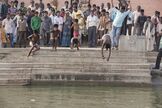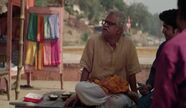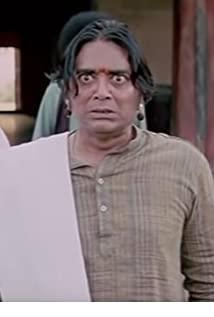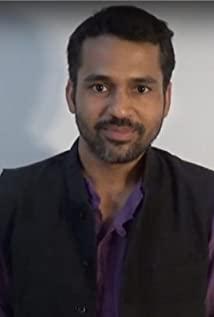I have always talked about magic realism when I heard people talk about Latin America. After reading some literary works, I gradually understood that the so-called magical realism seems to be an expression of poverty, corruption and absurdity. If so, I think another country has this kind of temperament, and that is India.
This is the second unpopular movie I want to talk about, India's "Death and Life", which was nominated at the Cannes Film Festival. In the past, the Cannes Film Festival was like a filter to me, through which I could avoid most of the movies I didn't like. In my stereotype, the label of Cannes is synonymous with boring, dull, slow-paced and pseudo-literary. Those award-winning films are a great test of my willpower. But afterwards, I was no longer so extreme. I became tolerant of multiculturalism and gradually liked some popular movies. I feel that some movies are not well-known, but they are excellent. I think someone will find their beauty, such as this "Death and Life".
The plot of this movie is very simple, but in these seemingly simple descriptions, the true state of the people at the bottom is fully displayed. Although the Indian people have been living hard enough in the impression of the Chinese people, many times we just know it. However, I don't know why. As for those little people in a bad environment, how do they struggle to survive? What do they think about every day? Are you worrying about mortgages and the education of the next generation like us? We have no way of knowing, and the charm of this movie is that it makes you understand and impress you.
The story is divided into two lines. The protagonists are young college students. As the plot develops, the two clues will merge into one.
first part.
Female college student Devi and his boyfriend who had been dating for a while came to the hotel together. The two were very cautious at first, and after a simple conversation to break the embarrassment, they began to make affectionate. However, before the two of them had been going on for long, the police broke into the door, which looked like the scene of Liu Qiangdong in Minnesota. If you watch a lot of Indian movies, you know that Indian police are almost synonymous with corruption. They came in such a timely manner, obviously they were well prepared. Sure enough, several policemen threatened and intimidated them, saying that they would be arrested and sent to jail. Of course, going to jail was only a cover, and taking the opportunity to blackmail a sum of money was the real purpose.
I'm not Indian, so I really can't think of a reason for them to go to jail. It's prostitution? Or adultery? Or premarital sex? However, the man felt so terrified that he could not face the coming humiliation, so he sneaked into the toilet, cut his wrist with a toothbrush and committed suicide.
Seeing this, I thought the police would be out of luck, and they would probably consider how to deal with the aftermath. Ironically, this actually gave them another opportunity for extortion. The police found Devi's father and asked him to put out three hundred thousand rupees, otherwise the daughter would be charged with abetting suicide by the court, and their daughter's sex video would also be put on the Internet by them. Faced with the threat of the police, his father Patak was at a loss. At first he argued a few words, but the ferocity of the police made him finally choose to be patient.
I didn't understand it at first. I thought that Patak could be regarded as a cultural man. India is a democratic country. Could it be possible that just this group of black police can be lawless? But in the end, I thought about it from the perspective of a father, and it seemed that I got the answer. As a father, of course, he hopes to preserve his daughter's reputation and give her a sunny and warm life. For this reason, he can do it at any cost. If things go wrong, the bad guys can indeed be punished, but what about the daughter's dignity and honor? It was all destroyed. So swallowing your breath is not cowardice, but greater courage. After all, due to cultural and religious factors, sex is still a shameful topic in rural India.
Devi's father used to teach in a university. Perhaps because he was too busy at work to take care of his daughter, he quit his job and switched to helping people translate scriptures by the Ganges. Devi's mother died of a cold. At that time Patak ignored his wife's illness because he was too busy. His wife's death was beyond his reach and became a shadow for a lifetime. Patak’s monthly income is about 10,000 rupees, which in my impression seems to be quite impressive in India. Three hundred thousand rupees, equivalent to his three-year income. By the way, the Ganges River in the movie is really dirty, muddy river water, the river is full of rubbish, and people burn all kinds of things there every day. Even so, there are still many people swimming in the river. .
Patak opened a small shop by the Ganges, and there was a child by his side to help him. The child's name is Qiangta, and the movie does not clearly indicate their relationship, but I guess Qiangta should be adopted by Patak. Qiangta likes diving and is obsessed with the game of catching coins in the water. It is a kind of gambling set up by the adults by the river. They make their own bank and hire a few children to dive for coins. Others place bets on who gets the coins. At most, the dealer's rake. It can be seen that Indians do everything they can to make a living.
Seeing that the adoptive father was blackmailed by the police, the sensible Qiang Ta wanted to share some of the burden for the adoptive father, so he proposed to Patak that he wanted to go to the river to fish for coins. It is estimated that the dealer would give the children the coins as rewards. At first Patak disagreed because it was dangerous, but Qiangta repeatedly pleaded and patted his chest to ensure that his swimming skills are top-notch. Patak was the only one. Reluctantly agree.
Devi's behavior made Patak feel extremely ashamed, he slapped his daughter severely and blamed her. But Devi felt that she had done nothing wrong, and she argued with her father. Later, Devi decided to leave his hometown in a fit of anger to find a job elsewhere.
Let me talk about the second line.
College student Deepak comes from a low-caste family. He lives in a slum by the Ganges. His father and brother helped people burn dead bodies by the river. Their family has been doing this for generations, with the exception of Deepak, who studied hard and was admitted to university to study civil engineering. Deepak has a few good friends who are also young people from poor families. They often ride around on motorcycles together.
One day, they went to the Internet cafe to surf the Internet. Deepak opened the social networking site and saw the beautiful girl Shalu. Deepak was a little moved, and friends urged him to pursue it. Deepak plucked up the courage to send a message to Shalu on Facebook, and then used various offensives to finally establish a relationship with her. But when their relationship went further, Deepak felt embarrassed. why? It turns out that Shalu's family is a high caste. Although the caste system was abolished in 1947, it is clear that people's beliefs in their bones are not so easy to change. Deepak is worried that his identity will make it difficult for this love to continue.
Shalu had joked with Deepak more than once, saying that she wanted to visit his house, but each time Deepak had a prevarication. Deepak didn't want Shalu to see her poor living environment and those poor friends. Once, Shalu suggested that when he went to Deepak’s house, Deepak’s self-esteem was completely hurt. Deepak said angrily about his origin and living environment. He dealt with his previous worries with a smashing attitude. He vented out of his brain, and then went back alone on his motorcycle, leaving Shalu with a puzzled look on the spot.
Shalu followed her parents on a pilgrimage to Sanggan. On the way, she saw her parents' contempt for low-caste people from the heart. For example, when eating out, parents will dislike the poor sanitary conditions in restaurants opened by low-caste people. She knew that her parents would never agree to her being with Deepak. However, she would not succumb to the ideas of her parents, nor care about Deepak's humble background. For love, she could elope with Deepak.
Shalu couldn't help calling Deepak to show her thoughts. Deepak was already disheartened, and was overjoyed when he received the call. Shalu's confession has even untied his long-standing heart knot. He didn't expect that the other party would not mind his class at all, and would even elope with him. It seemed that he was too sensitive and fragile at the beginning. Seeing this, I suddenly feel sore. Sometimes I feel that being a poor person is really pitiful. The innate sense of inferiority will always accompany their growth and it will take a long time to disappear.
The plot seems to be perfect here, but the fate is always full of absurdity, especially in India. The development of the next story does not depend on the wishes of the audience at all, but is full of unknown fate. In the end, the two story lines will be intertwined in an unexpected way, allowing the audience to feel the elusiveness of fate.
I won’t be spoiled here, everyone had better go and see it in person. This movie is excellent. It allowed me to see a real Indian society, understand the contradictions and cruxes in Indian society, and the real ordinary lives of those little people. Some of the characters in it also impressed me, such as Patak and Qianta.
Although Qiangta was beaten by Patak for being naughty, and Patak was slapped by Patak for not diving, but in his heart, Deepak regarded Qiangta as his biological son. On a certain dive, Patak placed a pressure injection of 10,000 rupees to win the strong tower, but after the strong tower dived into the water, it did not come out for a long time. Patak was very anxious, and quickly let the people next to him go into the water to rescue him, and Qiangta was sent to the hospital. When Qiangta was unconscious, Patak was crying on the bedside, crying and saying that he would never go diving again.
And David, I hated her extremely at first, because no matter what, she should be responsible for things that happened because of her. But I always saw my father running to raise funds, but she was indifferent. Not only that, she also quit her job at the university willfully, which was found for her by her father after hardship. But later, my impression of her changed again. It turned out that she really worked steadily in the field for a month and collected 20,000 rupees to pay off the debt. It seems that she still has a little responsibility.
Some scenes in the movie also impressed me deeply. The rural areas of India are really poor. The people who burned corpses on the Ganges were dressed in ragged clothes. The expressions on their faces were simple and dull, and their smiles were even more honest. The breath makes people feel pity. Deepak studies hard and wants to change the status quo, which reminds me of the left-behind children in China.
In short, this is a movie that surprises me. Due to the cultural atmosphere, most of the Indian films have positive energy. Although some of them also reflect some social issues, some themes are not really touched, such as the caste system. This film reveals a certain side of India, from this side, you can see some similar shadows.
People who like my film reviews can follow my WeChat public account and search for "Autumn Dreamless Essays""
View more about Masaan reviews











